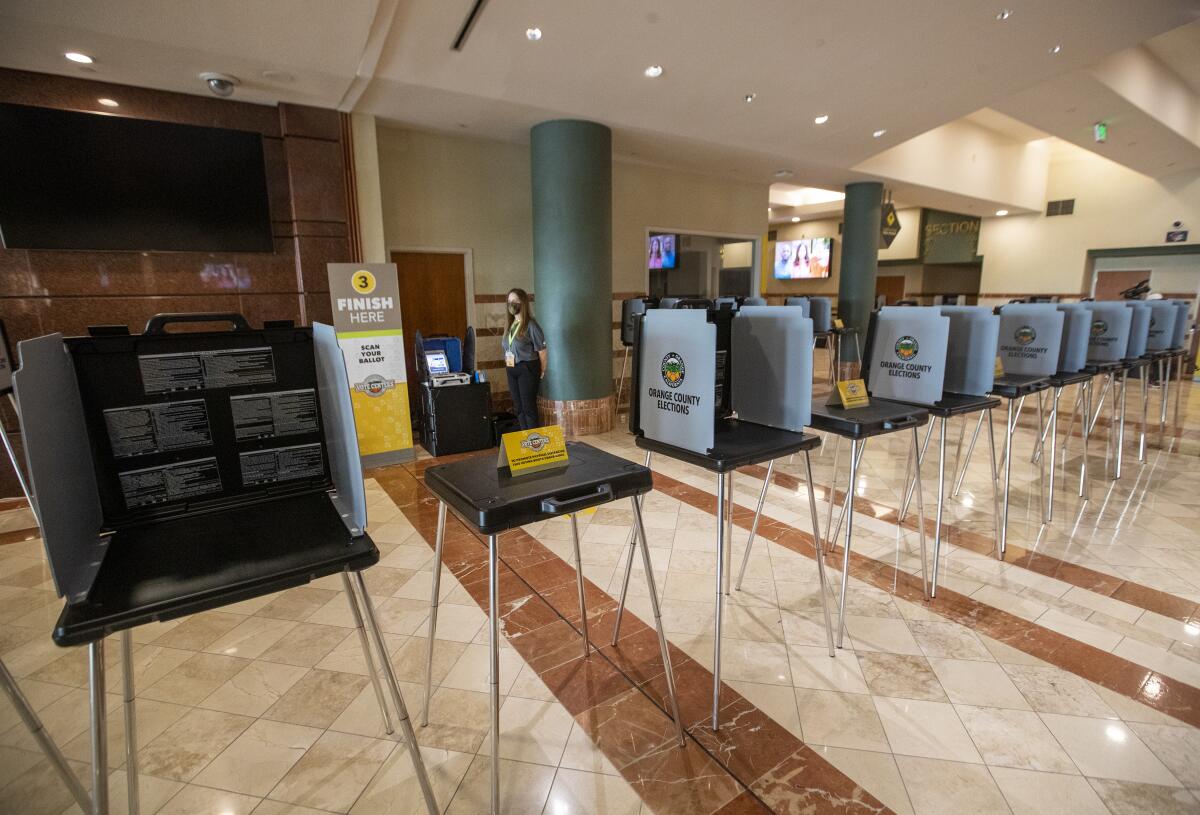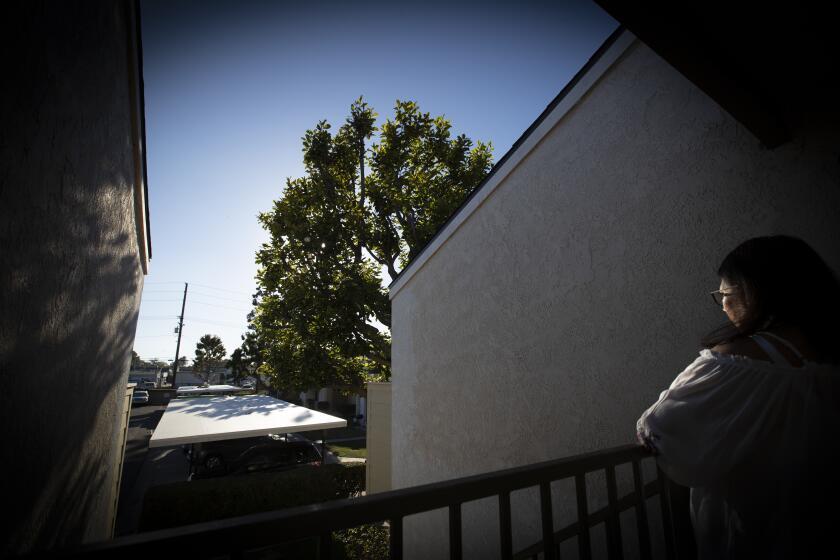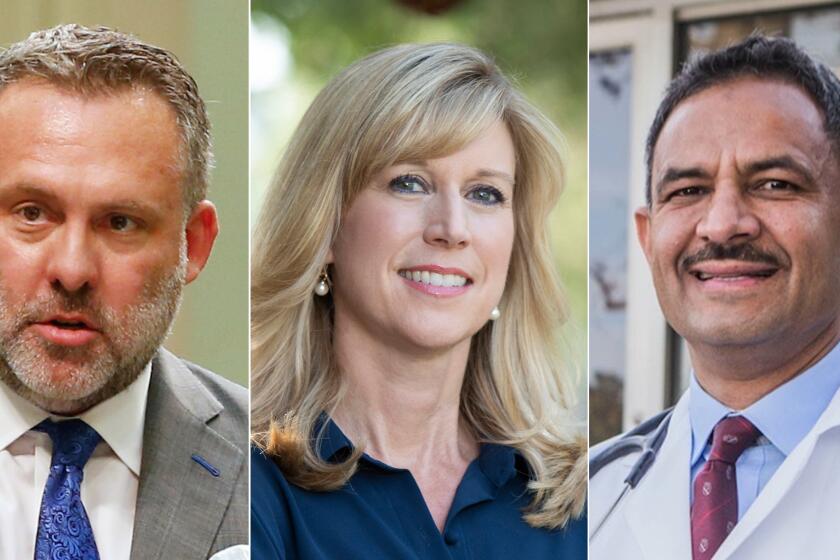Political group taps small-business owners in Orange County to help capture Asian American vote

Expanding its effort to mobilize Asian American and Pacific Islander voters for the midterm election, a national political group is targeting three close congressional races in Orange County and looking to small businesses to boost support for Democrats.
Justice Unites Us, a super PAC run by AAPI Democrats, will focus on trying to flip the O.C.-centered inland seats of Republican Reps. Young Kim and Michelle Steel while safeguarding Democratic Rep. Katie Porter in a predominantly coastal district.
As part of its national multimillion-dollar effort, the organization plans to tap into small-business hubs — grocery stores, dry cleaners, convenience stores — to help with voter outreach.
Organizers will meet with owners to share why they’re trying to rally the AAPI community to vote, and ask whether they’re willing to help the cause, Justice Unites Us said. They’ll ask the owners to showcase literature about the election — printed in multiple languages or the language most used in the neighborhood — and to use their influence with loyal customers to help inform them on races.
The super PAC’s approach is one that immigrant communities might be more receptive to, said Rep. Ted Lieu, a Democrat from Torrance who is honorary co-chair of Justice Unites Us.
Lieu, who is Taiwanese American, pointed to his own upbringing, which included helping his family with its small business. They sold gifts and jewelry at flea markets until they were able to run six gift stores. He recounted how many people would come in or pass by when he and his brother would watch over one of the shops after school.
After the Supreme Court’s Roe ruling, three generations of Latinas in an Orange County family reflect on how their stances on abortion have evolved.
For Asian American residents in Orange County and elsewhere, “maybe the best way to get their information is they go talk to someone that they know or they have a conversation at a local small business with the owner they know,” Lieu said. “They have a chat with another friend while at a local small business that has a bunch of fliers for Jay Chen for Congress. They pick one up and they see it in their language.”
Chen, a businessman, lieutenant commander in the Naval Reserves and Mt. San Antonio College trustee, is challenging Steel in the newly drawn 45th Congressional District, which includes the Asian American hubs of Westminster, Cerritos and Artesia. Dr. Asif Mahmood, a pulmonologist, is vying with Kim in the 40th District, which includes Rancho Santa Margarita and Aliso Viejo.
The Republican National Committee is also taking stock of what motivates AAPI voters, with outreach such as setting up tables at gas stations to ask residents about their concerns. The committee’s presence in Orange County, where it opened an AAPI community center last year, is its strongest in the state because of its “robust team,” California RNC spokeswoman Hallie Balch said.
The race between Rep. Michelle Steel and Jay Chen in a congressional district drawn to empower Asian Americans now features charges of racism, sexism and red-baiting.
Both major parties traditionally ignored this demographic until recently, when Orange County races grew more competitive and officials realized the size and growth of this diverse population, said Karthick Ramakrishnan, a professor of public policy at UC Riverside.
Asian Americans make up the fastest-growing racial or ethnic group in the United States, according to the Pew Research Center. In Orange County, home to one of the largest Asian American communities nationwide, well over a fifth of the population is AAPI, according to the U.S. Census.
Minh Nguyen, executive director of Justice Unites Us, noted the diversity of Orange County’s AAPI population, and said, “If our voters band together, we can not only help Democrats both win two targeted races but potentially help our party keep control of the House.”
In addition to partnering with businesses, the PAC will also focus on traditional door-knock and phone-bank campaigning in its target areas, including Orange County.
The county was long a deep-red conservative stronghold, but it has become increasingly purple in recent years. As of March, 37% of the registered voters in the county were Democrats, compared with some 33% registered as Republicans, according to the nonpartisan California Target Book, a subscription-based service detailing political campaign information.
The Democratic Congressional Campaign Committee committed a seven-figure investment nationwide to help mobilize AAPI voters a year ahead of the midterms. It plans to work with community leaders on outreach, conduct research on various areas’ needs and work to dispel disinformation on social media.
Justice Unites Us — which under political action committee rules is not allowed to coordinate with campaigns — is also launching its targeted outreach in key U.S. Senate races in Arizona, Pennsylvania, Nevada and Georgia.
Significant investment and attention to AAPI voters helped Democrats narrowly sweep all seven O.C. congressional districts in 2018, Ramakrishnan said.
On defense in much of the nation, Democrats aim to flip seven House seats in California as they try to hold off Republicans’ bid to control Congress.
In 2020, Kim and Steel helped Republicans push back against the blue wave and take back two competitive congressional districts in Orange County. The women also made history as two of the first three Korean American women elected to the U.S. House of Representatives.
The next year, the RNC capitalized on the momentum and opened an Asian Pacific American community center in Westminster’s Little Saigon.
The facility, which is also used as an RNC field office, has been used by residents to host dance classes, share meals together and play games, in addition to phone banking, Balch said.
The RNC also expanded the languages offered in outreach materials to include Vietnamese, Korean and Chinese as well as Hindi and Spanish. This weekend, the RNC will host its first class at the center for those working toward citizenship, providing the sort of civics questions that appear on the naturalization test, Balch said. Attendees will also receive help with English language skills, she added.
“We have some of the most active volunteers launching out of that office,” she said. “The ground game is really strong. There’s people knocking doors every single day, phone banking multiple times a week, and always door launches happening on the weekends.”
As campaigns begin to gear up, Ramakrishnan predicts AAPI voters may once again help flip red districts back to blue, largely fueled by concerns over hate crimes.
He is intrigued to see how the approach used by Justice Unites Us will play out with businesses in the county.
“These ethnic businesses have traditionally not put out partisan literature,” Ramakrishnan said. “It’ll be interesting to see if some of this is more kind of partisan messaging — how much these ethnic business owners will allow those because they don’t want to necessarily alienate their customer base either. So, I think they’ll have to get creative in terms of how to engage these folks.”
More to Read
Get the L.A. Times Politics newsletter
Deeply reported insights into legislation, politics and policy from Sacramento, Washington and beyond. In your inbox three times per week.
You may occasionally receive promotional content from the Los Angeles Times.














